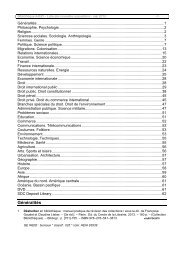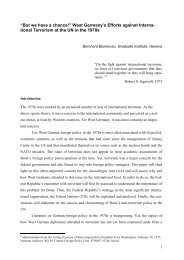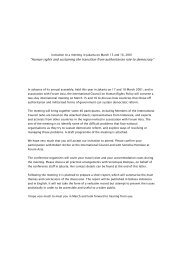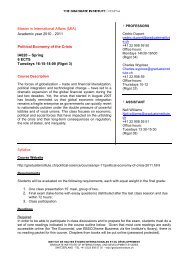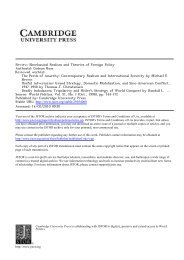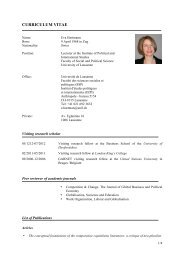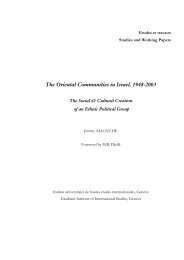Extending International Criminal Law beyond the Individual to ...
Extending International Criminal Law beyond the Individual to ...
Extending International Criminal Law beyond the Individual to ...
You also want an ePaper? Increase the reach of your titles
YUMPU automatically turns print PDFs into web optimized ePapers that Google loves.
<strong>Extending</strong> <strong>International</strong> <strong>Criminal</strong> <strong>Law</strong> 907<br />
turn on accomplice liability, or complicity. 29 The most developed jurisprudence<br />
has turned on <strong>the</strong> concept of complicity in international criminal law, <strong>to</strong> which<br />
we now turn. 30<br />
4. Complicity in <strong>International</strong> <strong>Criminal</strong> <strong>Law</strong><br />
Let us consider how <strong>the</strong> complicity article in <strong>the</strong> ICC Statute has been considered<br />
in <strong>the</strong> context of recent litigation under <strong>the</strong> ATS. In <strong>the</strong> recent ruling from<br />
<strong>the</strong> US Court of Appeals for <strong>the</strong> Second Circuit, in <strong>the</strong> case of Khulumani v.<br />
Barclay National Bank, Ltd; Ntsebeza v. Daimler Chysler Corp, Judge Katzmann<br />
set out his appreciation of <strong>the</strong> complicity rule under that treaty, and suggested<br />
that this test was <strong>the</strong> appropriate one <strong>to</strong> be used in <strong>the</strong> context of claims in <strong>the</strong><br />
Federal Court concerning corporate complicity in violations of international<br />
law under <strong>the</strong> ATS. Katzmann reminds us why complicity is so crucial in this<br />
context: it allows a claim <strong>to</strong> be made against a corporation for a violation of <strong>the</strong><br />
law of nations that would often normally require state action. In his words:<br />
Recognizing <strong>the</strong> responsibility of private aiders and abet<strong>to</strong>rs merely permits private ac<strong>to</strong>rs<br />
who substantially assist state ac<strong>to</strong>rs <strong>to</strong> violate international law and do so for <strong>the</strong> purpose of<br />
facilitating <strong>the</strong> unlawful activity <strong>to</strong> be held accountable for <strong>the</strong>ir actions. It is of no moment<br />
that a private ac<strong>to</strong>r could be held liable as an aider and abet<strong>to</strong>r of <strong>the</strong> violation of a norm<br />
requiring state action when that same person could not be held liable as a principal. In our<br />
domestic law, it is ‘well settled that one may be found guilty of aiding and abetting ano<strong>the</strong>r<br />
individual in his violation of a statute that <strong>the</strong> aider and abet<strong>to</strong>r could not be charged<br />
personally with violating.’ In re Nofziger, 956 F.2d 287, 290 (D.C. Cir. 1992); see also United<br />
States v. Tannenbaum, 934 F.2d 8, 14 (2d Cir. 1991) (‘The fact that <strong>the</strong> accused does not<br />
possess <strong>the</strong> legal capacity <strong>to</strong> commit <strong>the</strong> substantive offense does not mean that he cannot<br />
be convicted ...of aiding and abetting <strong>the</strong> commission of <strong>the</strong> substantive offense by<br />
ano<strong>the</strong>r. Thus, <strong>the</strong> inability <strong>to</strong> commit <strong>the</strong> substantive offense is immaterial.’ (citations<br />
omitted)). Indeed, ‘[t]he doctrine is of ancient origin.’ Nofziger, 956 F.2d at 291.<br />
<strong>International</strong> law, <strong>to</strong>o, recognizes that criminality is assessed by reference <strong>to</strong> <strong>the</strong> actions of<br />
<strong>the</strong> principal, not <strong>the</strong> aider and abet<strong>to</strong>r. See Akayesu,Trial ChamberJudgment, ô 528 (‘[I]t<br />
should be unders<strong>to</strong>od that <strong>the</strong> physical act which constitutes <strong>the</strong> act of complicity does not<br />
have its own inherent criminality, but ra<strong>the</strong>r it borrows <strong>the</strong> criminality of <strong>the</strong> act committed<br />
by <strong>the</strong> principal perpetra<strong>to</strong>r of <strong>the</strong> criminal enterprise .... The accomplice has not<br />
committed an au<strong>to</strong>nomous crime, but has merely facilitated <strong>the</strong> criminal enterprise committed<br />
by ano<strong>the</strong>r.’ 31<br />
It is enough that <strong>the</strong> corporation is complicit in a violation of international law<br />
by a government. This need not be related <strong>to</strong> an obligation that <strong>the</strong> corporation<br />
29 For an overview see <strong>the</strong> forthcoming report (three volumes) by <strong>the</strong> <strong>International</strong> Commission of<br />
Jurists’ Expert Legal Panel on Corporate Complicity in <strong>International</strong> Crimes.<br />
30 For a careful review of <strong>the</strong> US case law, see D. Cassel,‘Corporate Aiding and Abetting of Human<br />
Rights Violations: Confusion in <strong>the</strong> Courts’, 6 Northwestern University Journal of <strong>International</strong><br />
Human Rights (2008), 304, at http://www.law.northwestern.edu/journals/jihr/v6/n2/4/<br />
Cassel.pdf (visited 28 April 2008).<br />
31 Khulumani v. Barclay National Bank, Ltd; Ntsebeza v. Daimler Chysler Corp, US Court of Appeals<br />
for <strong>the</strong> Second Circuit, 12 Oc<strong>to</strong>ber 2007, 05-2141-cv, 05-2326-cv., at 46^47.



![Download [pdf] - The Graduate Institute, Geneva](https://img.yumpu.com/23370020/1/190x248/download-pdf-the-graduate-institute-geneva.jpg?quality=85)
